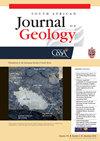磷灰石U-Pb年代学和微量元素地球化学在碳酸盐-磷灰石杂岩中的应用——以南非2.06 Ga Phalaborwa杂岩为例
IF 1.2
4区 地球科学
Q2 GEOLOGY
引用次数: 0
摘要
磷灰石的铀铅定年是通过激光烧蚀扇形场电感耦合等离子体质谱法(LA-SF-ICPMS)对来自南非Phalabowa火成岩杂岩内Loolekop磷碳酸盐岩侵入体的主要岩石类型的磷灰石进行的。对选定磷灰石的原位U-Pb分析产生的U-Pb年龄分别为2 083.9±41.9 Ma(n=33;MSWD=0.87)、2 020.4±116.7 Ma(n=18;MSWD=0.091)和2 034.3±39.0 Ma(n=17;MSWD=0.6),其中光卤石、带状碳酸岩和海侵碳酸岩的U-Pb组合年龄为2 054.3±21.4 Ma(n=68;MSWD=0.86),我们将其解释为指示侵位时间。磷灰石的U-Pb日期与先前研究中使用相同岩石类型的锆石和辉长岩U-Pb系统报告的日期相似,表明在没有其他常用的含U-Pb副矿物的情况下,磷灰石可以用作地质年代计,不仅在碳酸盐岩-光气岩杂岩中,而且在所有镁铁质火成岩侵入体中。锆石、巴德莱岩和磷灰石的年龄相似,表明后者几乎没有重新平衡,并表明Loolekop Pipe侵入体在侵位后~21Ma内冷却到350°C以下。这一结论得到了磷灰石BSE图像和微量元素系统学的支持,每个样品中磷灰石具有单峰火成岩微量元素特征。原位U-Pb地质年代学、微量元素地球化学和BSE成像相结合,使磷灰石成为研究碳酸盐岩-磷橄榄岩杂岩侵位机制的有用工具,这是特别有利的,因为磷灰石是这些岩组中的主要矿物相之一。本文章由计算机程序翻译,如有差异,请以英文原文为准。
Applying U-Pb chronometry and trace element geochemistry of apatite to carbonatite-phoscorite complexes – as exemplified by the 2.06 Ga Phalaborwa Complex, South Africa
Uranium-lead dating of apatite was undertaken by Laser Ablation-Sector Field-Inductively Coupled Plasma Mass Spectrometry (LA-SF-ICPMS) in situ on apatite from principal rock types of the Loolekop phoscorite-carbonatite intrusion within the Phalaborwa Igneous Complex, South Africa. In situ U-Pb analysis on selected apatite produces U-Pb ages of 2 083.9 ± 41.9 Ma (n = 33; MSWD = 0.87), 2 020.4 ± 116.7 Ma (n = 18; MSWD = 0.91) and 2 034.3 ± 39.0 Ma (n = 17; MSWD = 0.6) for phoscorite, banded carbonatite and transgressive carbonatite, respectively, with a combined age of 2 054.3 ± 21.4 Ma (n = 68; MSWD = 0.86), which we interpret to indicate the timing of emplacement. Apatite U-Pb dates are similar to dates reported in previous studies using zircon and baddeleyite U-Pb systems from the same rock types, showing that apatite can be used as geochronometer in the absence of other commonly used U-Pb-bearing accessory minerals, not only in carbonatite-phoscorite complexes, but in all mafic igneous intrusions. Similar ages for zircon, baddeleyite and apatite indicate little to no re-equilibration of the latter, and suggest that the Loolekop Pipe intrusion cooled below 350°C within ~21 Ma of emplacement. This conclusion is supported by apatite BSE images and trace element systematics, with unimodal igneous trace element characteristics for apatite in each sample. The combination of in situ U-Pb geochronology, trace element geochemistry and BSE imaging makes apatite a useful tool to investigate the emplacement mechanisms of carbonatite-phoscorite complexes, which is particularly advantageous as apatite is one of the main mineral phases in these rock suites.
求助全文
通过发布文献求助,成功后即可免费获取论文全文。
去求助
来源期刊
CiteScore
3.60
自引率
5.60%
发文量
18
审稿时长
>12 weeks
期刊介绍:
The South African Journal of Geology publishes scientific papers, notes, stratigraphic descriptions and discussions in the broadly defined fields of geoscience that are related directly or indirectly to the geology of Africa. Contributions relevant to former supercontinental entities such as Gondwana and Rodinia are also welcome as are topical studies on any geoscience-related discipline. Review papers are welcome as long as they represent original, new syntheses. Special issues are also encouraged but terms for these must be negotiated with the Editors.

 求助内容:
求助内容: 应助结果提醒方式:
应助结果提醒方式:


